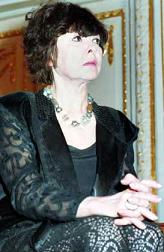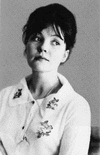|
КЛЯНУСЬ
Тем летним снимком: на крыльце чужом,
как виселица, криво и отдельно
поставленном, не приводящем в дом,
но выводящем из дому. Одета
в неистовый сатиновый доспех,
стесняющий огромный мускул горла,
так и сидишь, уже отбыв, допев
труд лошадиный голода и гона.
Тем снимком. Слабым остриём локтей
ребенка с удивленною улыбкой,
которой смерть влечет к себе детей
и украшает их черты уликой.
Тяжелой болью памяти к тебе,
когда, хлебая безвоздушность горя,
от задыхания твоих тире
до крови я откашливала горло.
Присутствием твоим: крала, несла,
брала себе тебя и воровала,
забыв, что ты - чужое, ты - нельзя,
ты - Богово, тебя у Бога мало.
Последней исхудалостию той,
добившею тебя крысиным зубом.
Благословенной родиной святой,
забывшею тебя в сиротстве грубом.
Возлюбленным тобою не к добру
вседобрым африканцем небывалым,
который созерцает детвору.
И детворою. И Тверским бульваром.
Твоим печальным отдыхом в раю,
где нет тебе ни ремесла, ни муки,-
клянусь убить елабугу твою.
Елабугой твоей, чтоб спали внуки,
старухи будут их стращать в ночи,
что нет ее, что нет ее, не зная:
"Спи, мальчик или девочка, молчи,
ужо придет елабуга слепая".
О, как она всей путаницей ног
припустится ползти, так скоро, скоро.
Я опущу подкованный сапог
на щупальца ее без приговора.
Утяжелив собой каблук, носок,
в затылок ей - и продержать подольше.
Детёнышей ее зеленый сок
мне острым ядом опалит подошвы.
В хвосте ее созревшее яйцо
я брошу в землю, раз земля бездонна,
ни словом не обмолвясь про крыльцо
Марининого смертного бездомья.
И в этом я клянусь. Пока во тьме,
зловоньем ила, жабами колодца,
примеривая желтый глаз ко мне,
убить меня елабуга клянется.
1968
|
I SWEAR
by that summer
snapshot taken
on someone else’s porch, skewed to
one
side, that looks so like a gibbet,
and
points a way out of the house not
into it;
where you are wearing some violent
sateen dress that
cramps the muscles of your throat
like armour;
and are simply sitting there, with
the endurance of a
tired horse after the labour of
singing out to the end all your
grief and hunger.
I swear: by that photo, and your
delicate pointed
elbows, which are as child-like as
the smile of surprise
that death uses to lure children to
itself and leaves
as a mark upon their faces for
evidence.
I swear: by the painful burden of
remembering
how I gulped your airless grief
from the
breathless rush of your lines, and
had to
keep clearing my throat until it
bled.
Yes, by your own presence, which I
have stolen,
burgled, taken for myself, as if
forgetting that
you belong to God, who cannot get
enough of you;
and by that starved emaciation
which
killed you at the end with its rat
tooth.
I swear: by the blesses Motherland
herself, even if
she grossly abandoned you like an
orphan;
and your beloved African, that
great genius of
kindness, whose own end was unkind,
now
as a statue watching over small
children.
By those children! And the Tversky
Boulevard!
And your own sad rest in Paradise,
where
there is neither trade nor torment
for you!
I swear: to kill that Yelabuga,
your
Yelabuga, so that our grandchildren
can sleep soundly. Old women may
still frighten
them at nights, not knowing the
power of her
existence, thing she doesn’t exist,
saying:
“Sleep little child, quietly,
quietly, for
blind Yelabuga is coming to catch
you.”
And with all her tangle of legs
truly she will
hasten towards me crawling with
horrible speed.
But I shall bring my boot down on
her
tentacles without saying any more,
and
put my weight on my heel, and my
toe-cap into
the back of her neck, and keep it
there.
Then the green juice of her young
will burn
the soles of my feet with their
poison, but I’ll
hurl the egg that ripens in her
tail
into the earth, that bottomless
earth!
And not say a word of the porch of
the photograph.
I will not speak of Marina’s
homeless death.
I swear it. Even while in
the dark, and in the stench of
silt,
with the toads in the well about
her, she
had one yellow eye fixed in my
direction:
The Yelabuga
swears her own oath – to kill me!
Translated by Elaine Feinstein
Yelabuga
was the town in which Marina Tsvetaeva killed herself.
|
|


